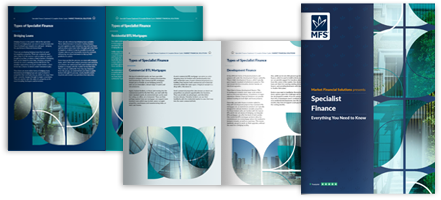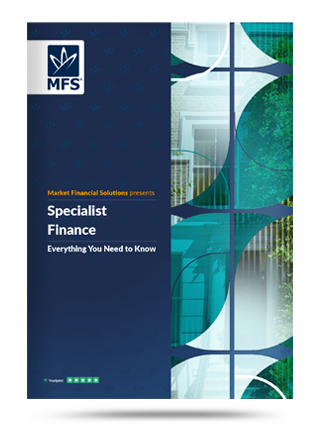Market Financial Solutions are a bridging loan and buy-to-let mortgage provider and are not legal, financial, investment or tax advisers. This document is for informational purposes only and does not, and should not be considered, to constitute legal, financial, investment or tax advice or be relied upon by any person to make a legal, financial, investment or tax decision. Therefore, Investors are encouraged to seek appropriate professional advice. The information in this content is correct at time of writing.

The property market today is flooded with a variety of financial products. Products designed to help prospective homebuyers get onto the housing ladder and enable property investors to develop their portfolios.
Yet, whether someone is a first-time buyer or a buy-to-let landlord, finding the right finance for a property purchase is vital. Indeed, finding the right lender for one’s circumstances is equally important. When considering what lender to go for, prospective buyers are faced with two options.
On the one hand, they could go for a one size fits all approach on the high street with a mainstream lender. On the other, they might consider a specialist lender. However, many people might wonder, what is a specialist lender?
To explore this further, we have pulled together this blog, in which we will consider the following questions:
- What is specialist lending?
- What are specialist lenders offering?
- Why use specialist lenders?
- What do I need to work with specialist lenders?
- Private vs specialist lending: what is the difference
What is specialist lending?
In simple terms, specialist lending is a segment of the market dedicated to providing finance solutions to borrowers with unique circumstances. Those borrowers might not fit into the typical criteria high street banks and lenders might look for when supplying a loan or other financing options.
What is a specialist lenders offering?
Specialist lenders are much more flexible than high street lenders. As such, they can offer finance suited to a wider range of financial needs. This flexibility is likely to suit those who may struggle on the high street. Investors based abroad, or those with less-than-perfect credit histories are unlikely to get far with the big-name banks.
Loan affordability tests are getting harder to pass, while lending criteria is becoming increasingly tight. However, while barriers to entry are thrown up for all but the most vanilla of cases, specialised finance takes unique – and real world – backgrounds in stride.
From bridging loans to buy-to-let finance, short-term lenders can provide investors with bespoke solutions to suit their funding requirements. This includes the types of products that many borrowers may not have even realised existed. At Market Financial Solutions, we have self-employed mortgages, SPV mortgages, bad credit mortgages, and more at the ready.
Every one of our products is tailored to the underlying borrower’s circumstances. So, for instance, those with non-standard income sources will receive a non-standard income related product that’s designed to accommodate this reality. There are multiple niches we can adapt to and so long as the borrower’s situation and preferences works with our parameters, our underwriters (who are there from day one of an enquiry) will do everything they can to progress a deal.

Bridging Loans
A bridging loan is a form of specialist lending that provides investors with fast and flexible funding for their property investments. These short-term loans help to bridge the gap between payments. As such, people or companies might use them to:
- Secure an asset whilst they arrange a long-term financial solution
- Bridge the gap between the sale of a property and the completion of a new one
- Finance a quick renovation project
- Purchase a property at auction
Typically, these loans can last from 3-24 months. Find out more about Market Financial Solutions’ bridging loans
Buy-to-let finance
Buy-to-let finance (BTL) includes specialist lender mortgages designed to help landlords buy a property that will be used as a rental home. These have slightly different rules to a normal mortgage and can provide optionality and breathing space between bridging loan exits or initial purchases and future long-term options.
Moreover, buy-to-let finance can be provided for holiday/short term lets, investors with impaired credit, expats and foreign nationals, or companies. While differing from bridging loans, they also focus on the bespoke. This flexibility allows for tailored service and funding.
You can learn more about Market Financial Solutions’ buy-to-let mortgages offering.
Why use specialist lenders?
Specialist lenders deliver greater flexibility and speed than high street comparatives. Unlike high-street banks, they underwrite their loans manually. This allows them to approach each application on a case-by-case basis.
This means the full nature and complexities of an applicant’s personal and financial situation can be taken into consideration. As such, specialist lenders can provide borrowers who don’t fit into traditional lending models with greater accessibility to financial solutions. However, the personalised approach to lending increases the risk to the lender, so higher rates are more common when using these bespoke products.
Generally, specialist products such as bridging loans are unregulated. This means they’re used by intermediaries, property investors, developers, and landlords solely for investment purposes. They cannot be used by borrowers to purchase homes they’ll end up living in.
As they’re unregulated, they can be issued with much more flexibility and speed than their regulated counterparts. It should be noted that while specialist lenders aren’t regulated, they are supervised by the FCA for anti-money laundering purposes. Also, Market Financial Solutions specifically is partnered with several associations that set out best industry practices. This includes NACFB, FIBA, BDLA, IMLA, and UK Finance.
What do I need to work with specialist lenders?
Lenders’ eligibility may vary, but typically all applicants will need to submit proof of identity and proof of address. Lenders will also require evidence of affordability as well as a proof of the value of the property the loan will be secured against. Here at Market Financial Solutions, we have clear applicant criteria that need to be met before we issue a loan. Borrowers can find out what our criteria are.
Private vs. specialist: what is the difference?
A private lender provides private money – which may not be tied to a bank or other credit firm – to individuals or companies. This can come in the form of a loan but can also include bonds or other types of securitisations. The loans are often made with very few regulations placed on them. As such, the risk factor is much higher for both the borrower and the lender.
On the other hand, specialist lenders deliver loans with underwriting services and more robust processes in place. As such, individuals who use specialist finance can expect a similar level of flexibility to a private loan, but with less risk. By using bridging finance, borrowers can raise capital by securing the debt against any existing property assets in their portfolio. They can benefit from the fact they are borrowing against the value of a property, and not the purchase price.
As a specialist lender, Market Financial Solutions prides itself on the ability to deliver loans to a variety of borrowers with speed and flexibility. In short, we can offer financial solutions to borrowers other lenders might shy away from.
To find out more about how Market Financial Solutions could support borrower’s property investment plans, contact us today.

The Complete Guide to
Specialist Finance
Everything you need to know
- What is Specialist Finance?
- Types of Specialist Finance
- Understanding the process
- Training & upskilling
- How to find clients
- Case scenarios





